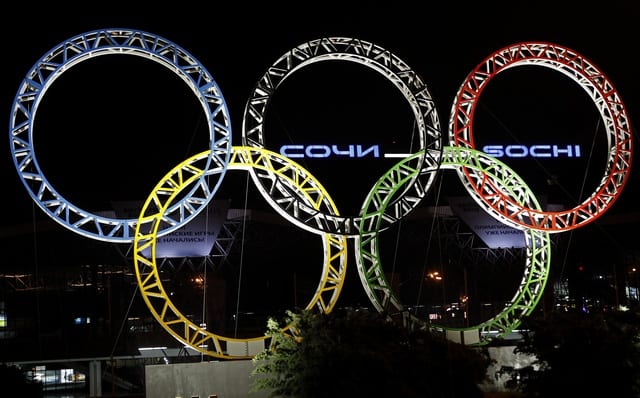Sochi 2014: In Anticipation of Disasters?
By Slovo, on 7 February 2014
Winter Olympic Games
There is this rather worrying trend with news: media loves disasters, global or personal. Failures, catastrophes, accidents, public embarrassment or someone’s dramatic tabloid undoing following a chain of scandalous events… The astute modern thinker Alain de Botton brings this media fascination with disasters to a decent analysis in his latest book The News. An equally curious phenomenon, he says, is how often we find disaster stories incredibly uplifting and exciting. So it is of no surprise that media garlands of socio-economic disaster stories, i.e. the embarrassing infrastructure of Sochi, its ignorant mayor and LGBT discrimination in Russia, overshadow the Sochi Winter Olympic Games this year.
Some 2014 Winter Olympic Games slogans, which satellite the event:
“Sochi mayor tells BBC: no gay people in our town” (bbc.co.uk)
“More Olympic-Linked Furor Over Russia Anti-Gay Law” (abcnews.go.com)
“And the gold medal for the most vile thing at Sochi goes to . . .? (Clue: it’s not Putin) Olympic visitors’ horror at hotels awash with stray dogs, brown water, bugs and no light bulbs” (dailymail.co.uk)
“Baffled Olympic journalists tweet surprising, gross finds” (euronews.com)
“Sochi: Hotel Horros Haunt Olympic Journalists” (hollywoodreporter.com)
The Games, commencing on February 7th and running until February 23rd, are hosted by Russia’s biggest resort-city – Sochi. Gracing the lush Black Sea coast, this longest city in both Europe and Russia has come to be known colloquially as the summer capital of Russia. Its famously overcrowded beaches of infinite human bodies, without a penny to be dropped, definitely support the expectations one would have of such a place. That is to say, it isn’t your average provincial Russian town. But as with many “peripheral” places in Russia, anything which isn’t Moscow pretty much, they remain a very different world – a phenomenon that some find as shocking as fascinating. In Russia, one doesn’t need to go on a gap year abroad to experience “the exotic Other”. One doesn’t need to wait for the Olympic Games in Sochi to realise that infrastructure is not a Russian forte. But then, of course, an ambitious project in a country as rightfully known for its space pioneering is just asking for trouble if things go wrong.
What about the problem of gay rights in Russia – big news, anyone? It’s been like this for a good number of centuries, bar Lenin’s de-criminalisation of gay rights. It’s understandable that a glamorous national event seems a good place to start… crashing the classical satellites of Olympics: national pride, ambition and success. Yet, the event is also inter-national, in fact – a leading global international event. The anti-gay propaganda law against promotion of homosexuality to minors has been passed on in the run-up to Olympics, causing a global resonance, boycotting and petitions to cancel the Games in a country, which is clearly too barbaric and intolerant. Yet, it’s fascinating to see things in perspective, with the World Wars being the only times when Olympic Games have been suspended; the Cold War period limiting the participation of the athletes. Let’s sincerely hope, that none of these are happening at the moment (at least not yet, or at least only subtly…).
The Olympic Games, set to celebrate the possibilities and splendour of human bodies internationally, have become exceedingly politicised, an excuse for media’s spilling of all held-back opinions over the years. It has long stopped being the peaceful ancient ritual of human achievement, uniting the five inhabited continents in the intertwined bewilderment of the Olympic rings. Dare I say, it seems somewhat out of place to mingle the Olympic Games with LGBT rights, essentially sport and sex. Not to say, that LGBT policy is unproblematic in Russia. But as a topic about relationships (no matter what kind), essentially sexual in nature, should it define the games and by default the sportsmen involved? It is a known amongst professional sportsmen that psychologically and physiologically sex is a disarming expenditure of energy, detrimental to success in sports. Many coaches prohibit intercourse, as well as expression of sexuality, for some time prior to competitions. Sex is about love, relaxation and leisure. Sport is about competitive anger, tension and hard work. The clue, from an American athlete Marty Liquori, seems rather simple: “Sex makes you happy, and happy people don’t run a 3:47 mile”. I guess my point is that it is rather unfair (and ironic) to sexualise the Games, as it is unfair to pose next to collapsed curtains in your hotel room in Sochi. Come on, you’ve been waiting for it! But then again, it seems, it’s not the first time media has been anticipating disasters and problems with such glee. Citius, Altius, Fortius!
By Eugenia Ellanskaya
 Close
Close


